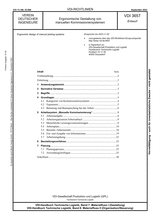Standards Worldwide
Standards Worldwide
Phone +49 30 58885700-07

Draft technical rule
VDI 3657:2023-09 - Draft
Ergonomic design of manual picking systems
- German title
- Ergonomische Gestaltung von manuellen Kommissioniersystemen
- Publication date
- 2023-09
- Original language
- German
- Pages
- 32
- Publication date
- 2023-09
- Original language
- German
- Pages
- 32
Product information on this site:
Quick delivery via download or delivery service
Buy securely with a credit card or pay upon receipt of invoice
All transactions are encrypted
Short description
Since the publication of the last issue in 1993, the world of work has changed significantly. While the ergonomic design of order picking workstations was the focus of production-oriented, ergonomic approaches without significant integration of information technology at the time, this picture has changed considerably due to the wide range of possible applications of digital technologies. A wide range of technical systems now support people in fulfilling manual picking tasks. As before, these are manual activities in which loads are moved and there are high work performances and quality requirements. Different sensory channels are used in the support systems, so that when designing the systems, mental stress must also be taken into account in addition to the physical requirements. The assessment of working conditions (so-called risk assessment) to improve the safety and health protection of employees is specified in the Occupational Health and Safety Act and its subordinate ordinances (in particular the Ordinance on Industrial Safety and Health and the Ordinance on Workplaces) with the respective technical rules (e. g. TRBS, ASR). There is increasing diversity among the employees themselves, i.e. the workforce is becoming more inhomogeneous. Furthermore, the demographic development must be taken into account. When designing the technology and work organization of the picking systems, a physiologically and psychologically favorable work design should therefore be achieved through the implementation of ergonomic knowledge. Economical and humane working conditions arise when technology is adapted to human performance requirements. The standard describes the state of the art and refers to literature sources that can be used. When designing manual picking systems, many ergonomic findings are relevant and specifications from the regulations and rules of occupational safety must also be observed. The policy lists the issues to be considered and provides references to the relevant sources. It ties in with VDI 3590 and provides information on how ergonomic findings can be used for the economical and humane design of manual picking systems.
Content
ICS
13.180,
53.080
Also available in
Loading recommended items...
Loading recommended items...
Loading recommended items...
